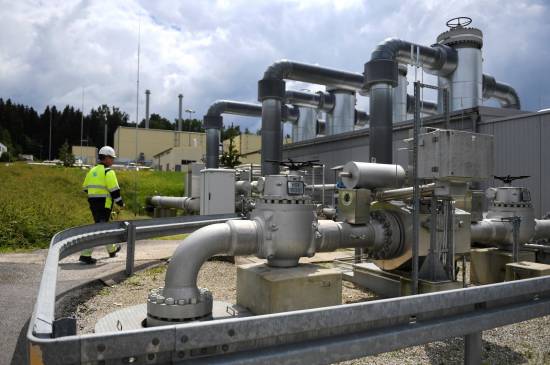Germany on Sunday said it would limit the use of gas for electricity consumption and announced further steps to boost storage levels to prepare for the next winter season, when it fears Russia could reduce or even completely halt supplies.
Following Russia’s invasion of Ukraine, Germany, which relies on Moscow for most of its gas, is attempting to phase out Russian energy. It has been trying to fill its gas storage facilities to capacity ahead of the winter months, when gas is more urgently needed as heating fuel.
The latest measures will include increased reliance on coal-fired power plants as well as an auction system to incentivize industry to consume less, Germany’s Economy Ministry, which oversees the security of energy supply in Europe’s top economy, said.
It also includes 15 billion euros ($15.8 billion) in credit lines for Germany’s gas market operator, via state lender KfW, to fill gas storage facilities faster, a government source said, asking not to be named.
Economy Minister Robert Habeck said that Germany will try to compensate for the move by increasing the burning of coal, a more polluting fossil fuel.
The decision by Berlin marks a turnaround by the ruling coalition of Social Democrats, Greens and the liberal FDP, which has vowed to wind down its coal usage by 2030.
“That’s bitter, but it’s simply necessary in this situation to lower gas usage,” Habeck said.
While the situation in the gas markets has become more acute in recent days, storage facilities are still able to make up the shortfall from Russia with purchases from elsewhere.
Still, Habeck said the situation was serious.
Russian gas company Gazprom announced last week that it was reducing supplies through the Nord Stream 1 pipeline for technical reasons. But European Union officials believe Moscow is punishing allies of Ukraine, where Russian forces launched an invasion in February.
Habeck said he believed the move was politically motivated.
“The tense situation and the high prices are a direct consequence of (Russian President Vladimir) Putin's war of aggression on Ukraine,” he said in a statement Sunday.
“What’s more, it is obviously Putin’s strategy to make us insecure, to drive up prices, and to divide us. We will not let that happen. We will fight back decisively, precisely and thoughtfully.”
Filling up gas storage facilities has become more challenging for Germany since Russia curtailed the capacity of the Nord Stream 1 by 60%, jeopardizing plans to bring storage levels to 80% by October and 90% by November.
So far, Berlin has managed to reduce the share of its natural gas supplied by Russia from 55% before the invasion to 35% – thanks to increased deliveries from countries like Norway and the Netherlands, and through liquefied natural gas (LNG) contracts./agencies


